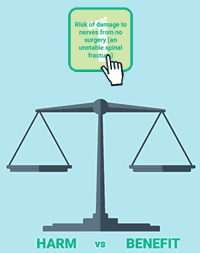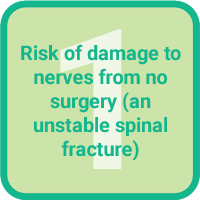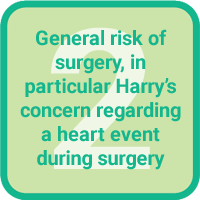for Harry
Considering surgery for Harry
The issue is raised at the lunch time ward meeting. The team is divided as to how they should proceed in light of Harry’s indecision.
View more of Harry’s story below to see what transpires.
Harms Vs Benefits
 There is no indication in the discussion between Harry and the neurosurgical registrar that Harry’s decision-making capacity is impaired. As highlighted in this discussion, the issue of proportionality (harms vs benefits) plays an important part in the decision to proceed with treatment.
There is no indication in the discussion between Harry and the neurosurgical registrar that Harry’s decision-making capacity is impaired. As highlighted in this discussion, the issue of proportionality (harms vs benefits) plays an important part in the decision to proceed with treatment.
In each case, decide if you think this issue is a harm or a benefit in considering the option of proceeding to surgery in Harry’s case. Drag the issue to the appropriate side of the scale (as demonstrated to the right).
Learn More: Obligation to proportionality (harms vs benefits)
Obligation to proportionality (harms vs benefits)
Clinical decision-making relies in part on our obligation to ensure that all interventions we offer patients accord with ‘proportionality”. That is, that the overall harms of the intervention are outweighed by the expected benefits. If specific interventions do not meet this ‘test’, they should not be offered. It should be noted, however, that what constitutes harm and what constitutes benefits can be contested, and may differ between different assessors. This is why we rely upon the shared decision-making process to ensure all of those perspectives are heard and considered.























